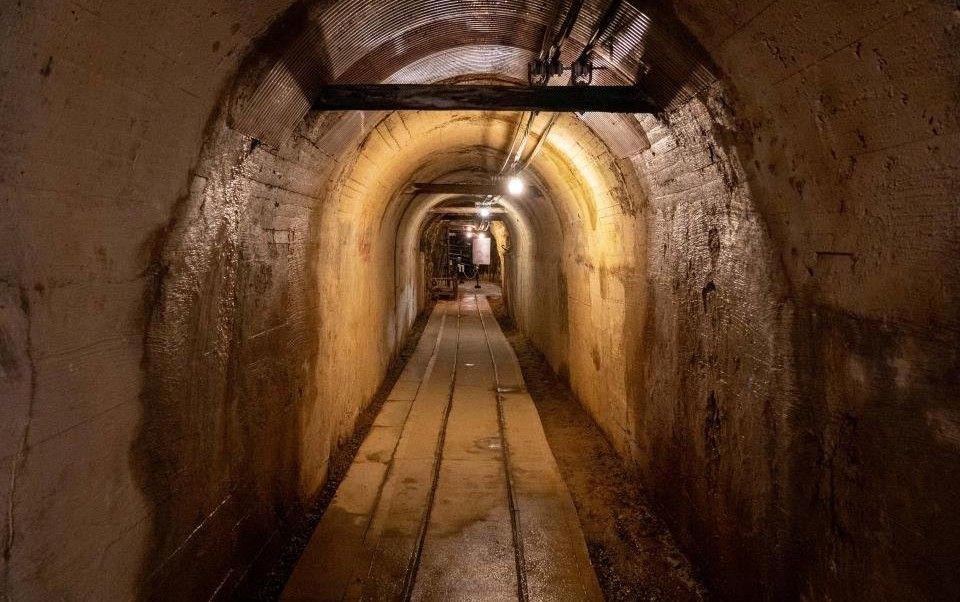 |
Sado Island Gold Mines. (Yonhap) |
South Korea on Saturday consented to Japan's long-pursued bid to have the gold and silver mines on Sado Island designated as a UNESCO World Heritage site, signaling a step towards reconciliation over historical disputes.
Seoul's agreement is contingent on Tokyo's commitment to take concrete actions to confront and acknowledge the dark history of forced Korean labor at the Sado mines during its colonial rule from 1910 to 1945, the Foreign Ministry in Seoul said.
South Korea approved the UNESCO World Heritage Committee's decision in New Delhi, India, in exchange for Japan's commitment to operate exhibitions portraying the reality of Korean forced labor at the Sado mines and to hold annual memorial ceremonies honoring the Korean workers, with Japanese officials in attendance.
Since 2010, Japan's relentless pursuit of a World Heritage listing for the Sado Island Gold Mines has fueled controversy in South Korea. The core of the controversy lies in Japan's deliberate omission of critical historical details regarding the forced mobilization of Koreans to work in the mines during its brutal colonial rule.
In its proposal for UNESCO recognition, Tokyo deliberately focused on the mine’s operations during the Edo period (1603-1867), intentionally excluding any reference to the Japanese occupation of the Korean Peninsula (1910-1945).
However, Seoul and Tokyo have now buried the hatchet, with the Japanese government taking prior actions before securing UNESCO World Heritage status, the Foreign Ministry in Seoul explained in a statement.
South Korea could have pushed for a vote on the listing of the Sado mines, which would have required the approval of a two-thirds majority, as one of the 21 rotating members of the UNESCO World Heritage Committee. However, it chose to follow the customary consensus approach instead.
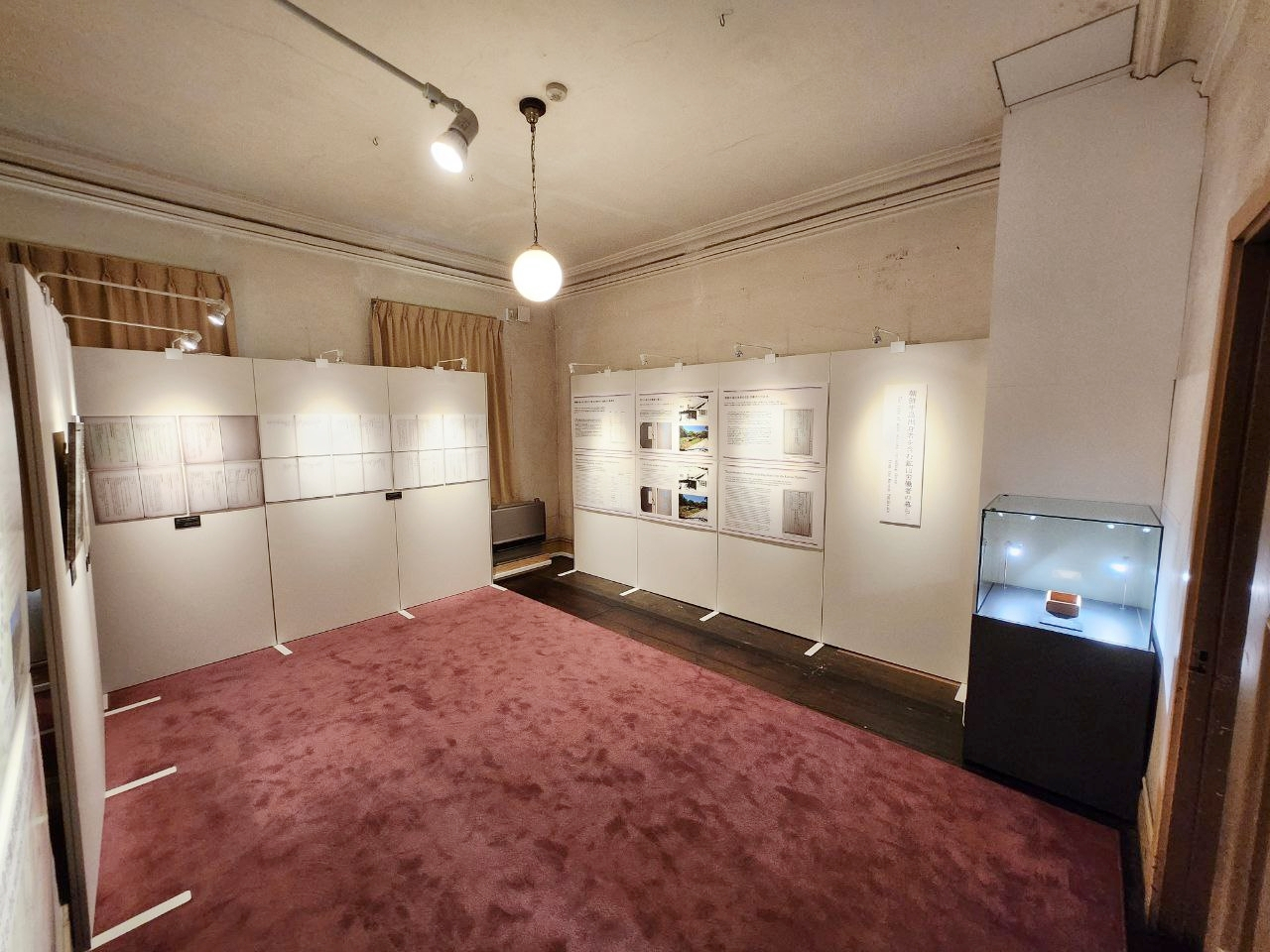 |
The exhibition titled 'The Life of Mine Workers, Including Those from the Korean Peninsula,' at the Aikawa History Museum on Sado Island will be open to the public starting Sunday. (South Korea's Foreign Ministry) |
Tokyo's concrete actions
Japan has already set up an exhibition titled "The Life of Mine Workers, Including Those from the Korean Peninsula" at the Aikawa History Museum on Sado Island, according to the ministry.
The exhibition, set to open to the public on Sunday, highlights the harsh living and labor conditions faced by an estimated over 1,500 Koreans who were mobilized to work at the Sado mines towards the end of Japanese colonial rule. According to South Korea's Foreign Ministry, the exhibition illustrates that Korean workers were often assigned hazardous tasks at mines such as drilling through rock.
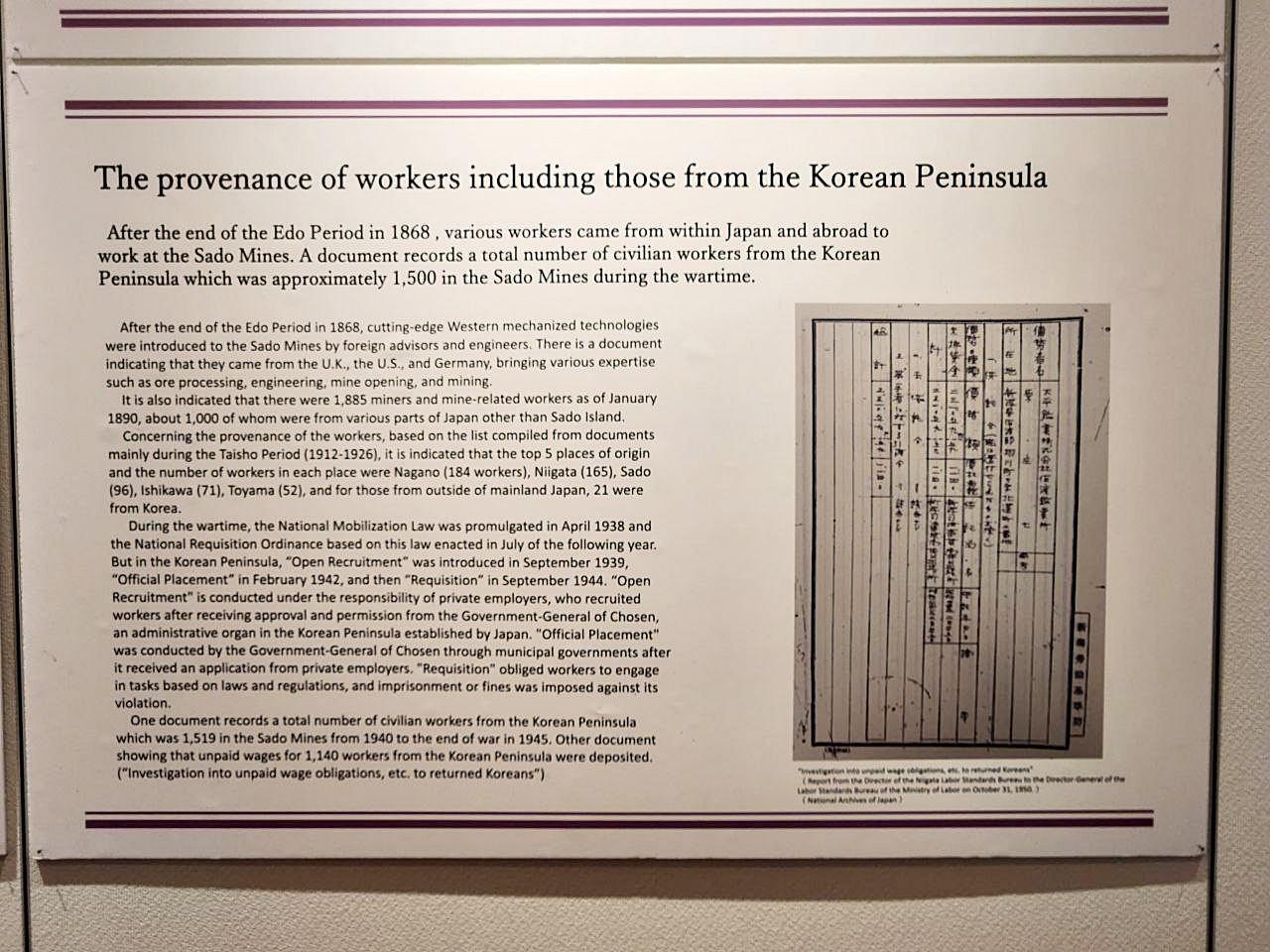 |
The exhibition illustrates how over 1,500 Korean workers were mobilized to work at Sado mines. (South Korea's Foreign Ministry) |
The exhibition also sheds light on ongoing conflicts over the working conditions, food shortages and reports of fatalities among the Korean workers. Notably, the exhibition documents that these workers labored an average of 28 days per month and includes records of their escape attempts and subsequent detentions.
South Korea's Foreign Ministry also disclosed that Japan plans to distribute brochures to tourists, which will include information about the exhibition on forced labor.
An estimated over 1,500 Koreans were forced to work at the Sado complex of mines under harsh conditions and without proper compensation toward the end of Japanese colonial rule in the 1940s, according to a joint report in 2022 by the Korean Center for Historical Truth and Justice in Seoul and the Network for Research on Forced Labor Mobilization in Kobe.
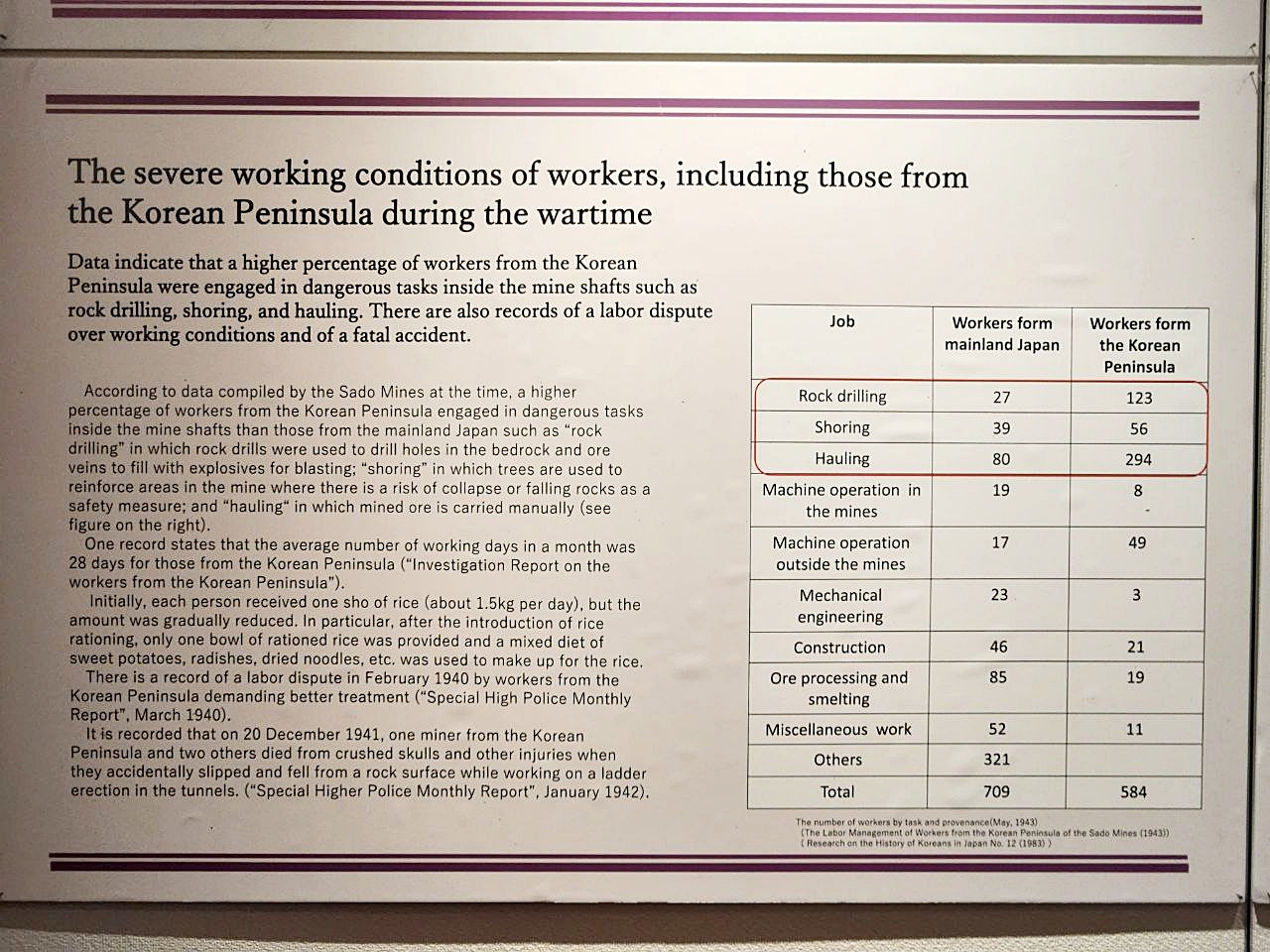 |
The exhibition illustrates the hazardous tasks assigned to Korean workers inside the Sado mines, highlighting that they worked an average of 28 days per month. (South Korea's Foreign Ministry) |
South Korea's Foreign Ministry also announced that Japan has committed to holding an annual memorial ceremony for the Koreans mobilized to work in the Sado mines. This ceremony will start this year and is scheduled to occur every July or August on Sado Island.
The specific date and location for this year's event are still being coordinated within Japan.
"Historically, memorial services in Japan have been organized by private groups, but the significance of the memorial service that Japan has promised this time lies in the participation of Japanese government officials," South Korea's Foreign Ministry explained.
The Foreign Ministry also noted that excluding the Kitazawa industrial site on Sado Island, known for mobilizing a significant number of Korean workers, from the World Heritage designation carries "considerable significance."
Criticism emerging
However, criticism has emerged as the Aikawa History Museum, featuring exhibitions on Korean forced labor, is situated in the Sakashita area within the Aikawa-Kamimachi district. This district has been excluded from the UNESCO World Heritage inscription, raising concerns about the museum's recognition and accessibility.
The Foreign Ministry acknowledged the situation but refuted these concerns, stating that the location of the exhibition "has only a minimal impact on both the presentation of the exhibits on Korean workers and the accessibility for tourists."
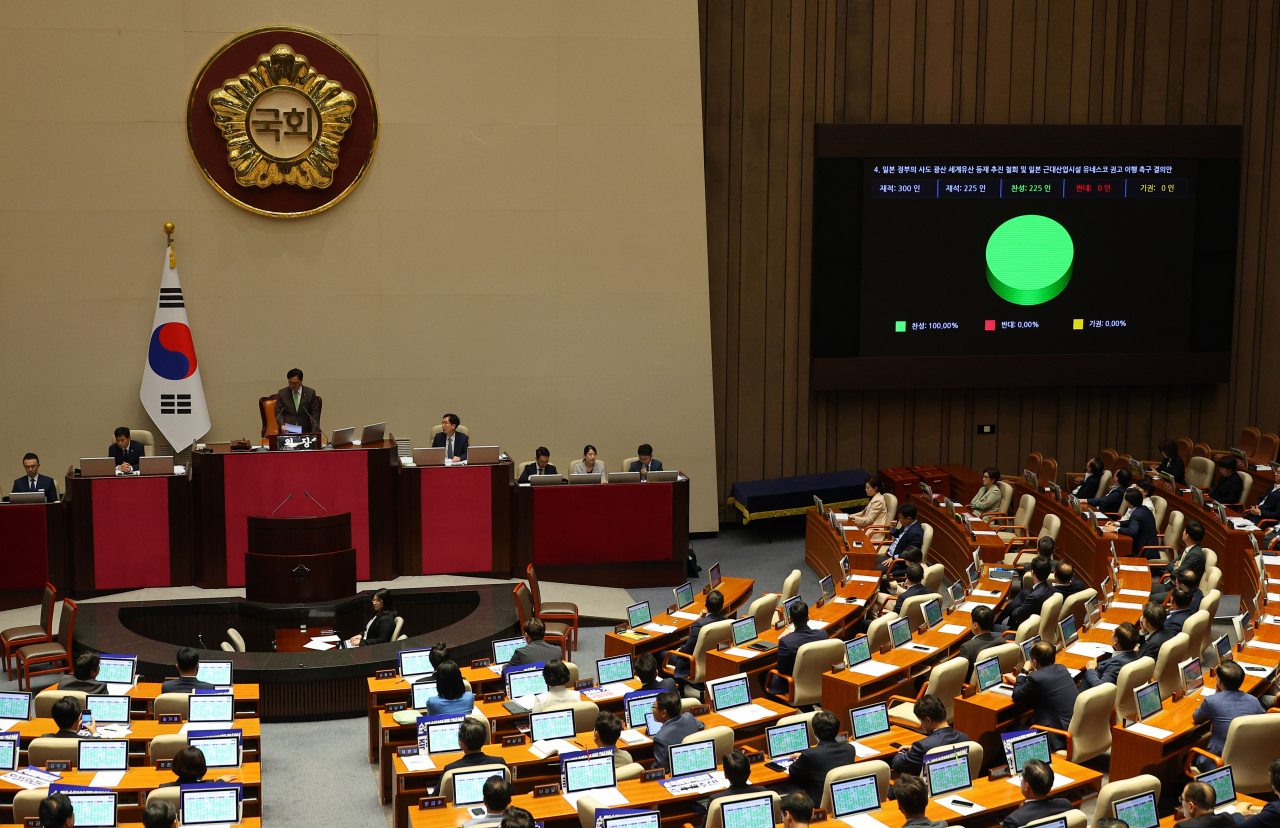 |
South Korea's National Assembly adopts a resolution urging the withdrawal of Japan's bid to register a former gold mine, linked to wartime forced labor, as a UNESCO World Heritage Site on Thursday. The resolution concerning Japan's Sado mine was passed unanimously during a plenary session, with all 225 attending members voting in favor. (Yonhap) |
A domestic backlash is anticipated, as the Foreign Ministry conceded that South Korea lacks the leverage to compel Japan to fulfill its commitments if Japan does not honor them.
"Since UNESCO is not the UN Security Council, there are no sanctions or penalties if Japan does not comply with this decision. Therefore, Japan's commitment to implementation is the most crucial factor," a Foreign Ministry official stated on Friday, speaking on condition of anonymity.
South Korea has had bitter experiences, being unable to hold Japan accountable for failing to honor its commitments, which was made when 23 sites from Japan's Meiji Industrial Revolution were registered on UNESCO's World Heritage List in 2015.
The Japanese government has yet to fully honor its promise to raise public awareness about the forced labor of Koreans and others under harsh conditions at certain industrial heritage sites, including Hashima Island, also known as Battleship Island, in the 1930s and 1940s. Key unfulfilled commitments include establishing an information center or informational panels to educate the public about this forced mobilization.
The main opposition Democratic Party of Korea on Friday stated that it "can never agree with the listing of the Sado mines as a World Heritage site," according to spokesperson Rep. Hwang Jung-a.
Hwang pointed out Japan's failures to keep promises regarding sites associated with Japan's Meiji-era industrialization.
"Shouldn't we first verify the fulfillment of the Hashima Island promise before seeking any new commitments from Japan?" she asked.
Hwang emphasized that "The Yoon Suk Yeol government should not use unfulfilled promises as an excuse to commit a historical injustice. It must block the designation of the Sado mines as a World Heritage site."






![[Lee Byung-jong] The perils of political leadership](http://res.heraldm.com/phpwas/restmb_idxmake.php?idx=644&simg=/content/image/2024/12/19/20241219050082_0.jpg)
